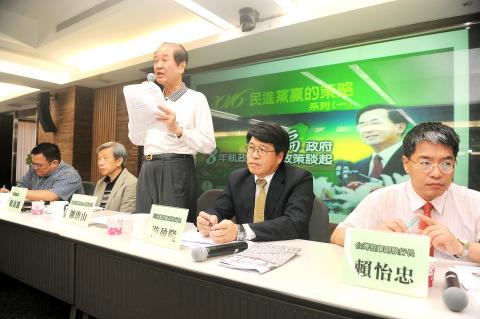Comparing the Democratic Progressive Party’s (DPP) China policy under former president Chen Shui-bian (陳水扁) and the party’s current policy is hard because of the rapidly changing dynamics of international politics, but there is no doubt that cross-strait policy during the Chen era was more than “eight lost years,” as some say, DPP members and academics said yesterday.
“The years between 2000 and 2008 were not lost years, but eight legendary, glorious years,” You Ying-lung (游盈隆), deputy executive director of the DPP’s think tank, told a forum in Taipei.
The forum, focused on the DPP’s China policy during Chen’s years in office and the party’s winning strategy in the 2016 presidential election, was organized by the Ketagalan Foundation, which was founded by the former president.

Photo: Liao Chen-huei, Taipei Times
You, who served in the DPP administration as vice chairman of the Straits Exchange Foundation, praised Chen as a pragmatic idealist, a practitioner of de jure independence and a leader who dared to confront Beijing and Washington to safeguard the nation’s interests.
Chen, who is serving a 20-year sentence for corruption charges, extended olive branches to China before July 2002, but dramatically changed his cross-strait policy after Beijing humiliated him by establishing diplomatic ties with Nauru, a former Taiwan ally, on the day he was sworn in as DPP chairman, You said.
Determined to walk his own path after that, Chen proposed the “one country on each side” initiative, holding several national referendums and staging discussions to write a new Constitution, You said.
While Chen’s legacy is debatable, the former president remains to this day the only DPP candidate to have won a Taipei mayoral election and two presidential elections, and has shown what it takes for to succeed politically, he said.
“The winning formula for a candidate is to be political and professional competent and have strong agenda-setting ability on cross-strait issues,” You said.
Meanwhile, Lai I-chung (賴怡忠), deputy executive director of the Taiwan Thinktank, challenged the “myths” that the triangular relationship between the DPP, the Chinese Nationalist Party (KMT) and the Chinese Communist Party (CCP) is important and the DPP’s China policy would be the “last milestone” the DPP had to cross to return power.
Overemphasizing the relationship is flawed because, while DPP-CCP talks are welcome, the administrations of Chen and former president Lee Teng-hui (李登輝) were still able to facilitate negotiations without “the political foundation” of the so-called “1992 consensus,” he said.
The last milestone for the DPP’s quest to return to power is not its China policy, but the feasible policy options it proposes for developing the national economy and trade to places outside of China, such as the ASEAN countries or India, Lai said.
“The last milestone for the DPP is freeing cross-strait policy of CCP-KMT domination,” Lai added.

Alain Robert, known as the "French Spider-Man," praised Alex Honnold as exceptionally well-prepared after the US climber completed a free solo ascent of Taipei 101 yesterday. Robert said Honnold's ascent of the 508m-tall skyscraper in just more than one-and-a-half hours without using safety ropes or equipment was a remarkable achievement. "This is my life," he said in an interview conducted in French, adding that he liked the feeling of being "on the edge of danger." The 63-year-old Frenchman climbed Taipei 101 using ropes in December 2004, taking about four hours to reach the top. On a one-to-10 scale of difficulty, Robert said Taipei 101

Nipah virus infection is to be officially listed as a category 5 notifiable infectious disease in Taiwan in March, while clinical treatment guidelines are being formulated, the Centers for Disease Control (CDC) said yesterday. With Nipah infections being reported in other countries and considering its relatively high fatality rate, the centers on Jan. 16 announced that it would be listed as a notifiable infectious disease to bolster the nation’s systematic early warning system and increase public awareness, the CDC said. Bangladesh reported four fatal cases last year in separate districts, with three linked to raw date palm sap consumption, CDC Epidemic Intelligence

US climber Alex Honnold left Taiwan this morning a day after completing a free-solo ascent of Taipei 101, a feat that drew cheers from onlookers and gained widespread international attention. Honnold yesterday scaled the 101-story skyscraper without a rope or safety harness. The climb — the highest urban free-solo ascent ever attempted — took just more than 90 minutes and was streamed live on Netflix. It was covered by major international news outlets including CNN, the New York Times, the Guardian and the Wall Street Journal. As Honnold prepared to leave Taiwan today, he attracted a crowd when he and his wife, Sanni,

Taiwanese and US defense groups are collaborating to introduce deployable, semi-autonomous manufacturing systems for drones and components in a boost to the nation’s supply chain resilience. Taiwan’s G-Tech Optroelectronics Corp subsidiary GTOC and the US’ Aerkomm Inc on Friday announced an agreement with fellow US-based Firestorm Lab to adopt the latter’s xCell, a technology featuring 3D printers fitted in 6.1m container units. The systems enable aerial platforms and parts to be produced in high volumes from dispersed nodes capable of rapid redeployment, to minimize the risk of enemy strikes and to meet field requirements, they said. Firestorm chief technology officer Ian Muceus said